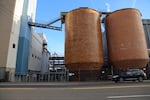
The Camas High School auditorium is Home to the Papermakers. The school's mascot is called the Mean Machine, an animated paper roll machine that's a nod to the town's paper making history.
Molly Solomon / OPB
It was around 7 p.m. on a recent Thursday night. A group of students streamed past the trophy cases along the wall and joined the packed stands for the Camas High School varsity basketball team’s season opener.
Parents and locals mingled and snacked on bags of popcorn, eager to cheer on a school that has come to symbolize Camas pride.
This is the home of the Papermakers.
The name alludes to the 134-year-old paper mill that at one time was the second largest in the world, employing nearly 3,000 people. In November, the company Georgia-Pacific announced it would be closing most of the mill’s paper and pulp production early next year.
The decommissioning of the the iconic landmark on the Columbia River is a story that's played out many times throughout the Northwest. And it means Camas, Washington, like other former mill towns, will have to figure out its future identity.

Camas High School Athletic Director Rory Oster in front of one of several trophy cases honoring the Papermakers.
Molly Solomon / OPB
Signs of Camas’ papermaking past are sprinkled throughout the high school campus. A large banner in the auditorium is decorated with rolls of toilet paper and the school’s fight song details Camas' founding as a mill town.
And then there’s Camas’ iconic mascot. He used to be Joe Papermaker, but now he goes by the Mean Machine, an animated paper roller that fires up the crowd during timeouts.
“You know there’s a lot of pride in this community,” said Rory Oster, the high school’s athletic director. “It’s a small town with a lot of history, a lot of tradition.”
Oster said it’s not unusual to see half the town pack into Doc Harris Stadium to catch a Friday night football game. The team’s last home game in October sold close to 7,500 tickets.
“There’s nowhere else around here like it,” Oster said.
Sitting in the back row of bleachers at the basketball game was Wayne Rash. He’s a former millworker himself and graduated from Camas High in 1964.
“I come to all the games. It doesn’t matter which sport,” he said, adding that he drove all the way to Spokane recently for an away game.
Rash said when he was growing up, almost everybody lined up for a job at the mill after graduation. Nowadays, most of the kids in this auditorium wouldn’t even consider that.

Former mill worker and Camas High graduate Wayne Rash at a recent Papermakers basketball game.
Molly Solomon / OPB
“It used to be the only thing in town,” said Rash, whose younger brother still works at the mill. “They’ve added a whole lot of other industry here now, but it’s still an icon. If the mill goes away entirely, it would certainly have an impact.”
Georgia-Pacific said up to 300 people will likely lose their jobs in the current reduction. Many of them are in their late 50s, a tough time to transition to another job or even a new industry.
Regional state economist Scott Bailey said the loss of mills in the Pacific Northwest is nothing new. Since 2000, around 10 paper mills have shut down in Oregon and Washington.
“There are other rural areas where there’s very few job opportunities left,” Bailey said. “And the loss of a mill has really devastated towns.”
But Camas is not your typical mill town. In fact, some would argue it hasn’t been a mill town for quite some time.

The paper mill has a 134-year old history in the town of Camas.
Molly Solomon / OPB
In the 1970s, a bitter union strike threatened to bring the city to a halt. It was the first time Camas seriously confronted the idea of diversifying its economy.
“There were a lot of us that realized that the golden goose could die any moment and we would be in financial ruin,” said former Camas Mayor Nan Henriksen.
To avoid a possible economic collapse, Henriksen knew Camas needed to attract new industry. And when a plot of land became available, the city bought it and converted it into a thriving business park.
Soon, high-tech companies like WaferTech, Analog Technologies and Sharp moved in, bringing big money and white-collar jobs. In 2008, Fisher Investments bought a piece of land and moved its corporate headquarters to Camas from California.
The town soon saw its population — and its median income levels — rise. All that new wealth had some wondering whether the city was losing its mill town roots.
“That was a real time of crisis and questioning who we were and what we would be in the future,” Henriksen said. “There were so many citizens who were so used to the paper mill, they just wanted it to stay the same.”
But Henriksen’s plan paid off. Camas is now praised as a model town for successfully shifting an economy toward new industry and away from a reliance on resource industry.
Cathy Huber Nickerson, the city’s finance director, said Camas has been "fortunate to have other businesses locate here.” She said the mill went from from 64 percent of the tax base in 1992 to just 5 percent in 2017.
“This would have been devastating to Camas 30 years ago,” said Mayor Scott Higgins, referring to Georgia-Pacific layoffs. “But today, we likely won’t even notice the financial impact.”

Current Camas Mayor Scott Higgins in his office, essentially a shrine to the Papermakers.
Molly Solomon / OPB
Higgins, a Camas High graduate, said the city has shifted over the years from a blue-collar mill town to one of the most expensive zip codes in the Portland metro area. Recent census figures show the median household income is close to $95,000, nearly double the median income in neighboring Vancouver.
“When I was a kid, you didn’t brag about the fact that you lived in Camas,” he said. “Now, we have billionaires that live here.”
Southwest Washington Congresswoman Jaime Herrera Beutler was a longtime Camas resident, and even Portland Trail Blazer Damian Lillard bought a piece of property on Lacamas Lake.
“All of these factors have made it so that we’re really not a mill town anymore, anywhere but in our mind,” Higgins added.
Somebody who’s seen those changes firsthand is Larry Littleton. He and his wife Sandy have lived in Camas near the bottom of Prune Hill since 1955. Littleton recently retired from Georgia-Pacific, capping off a 45-year career at the mill.
“The paper mill really was the heartbeat of the town, period,” Littleton said. “It was the driving energy behind the population growth, the building of a town here. Everything was centered around that mill.”

Sandy and Larry Littleton have lived in Camas since 1955. Larry recently capped off a 45-year career at the paper mill.
Molly Solomon / OPB
The Littletons point toward the hills behind their house. What used to be trees and forestland is now high-end view property with houses fetching well over a million dollars.
The Littletons call it southwest Washington’s Lake Oswego — a reference to one of Portland’s wealthiest suburbs.
“I miss the way it was. Things are different now,” Larry Littleton said.
“A lot of people that move here, they have no idea how important the mill was,” his wife Sandy added. “They barely notice it.”
Larry Littleton calls it "nostalgic heartbreak" to see the mill closing down most of its production line, including the paper machine he worked for several decades. But, he said, even if the mill eventually goes away entirely, the town will always be the home of the papermakers.
“There’s a lot of people that aren’t about to give up that identity and there’s a lot of people here that still see this as a mill town,” he said. “Because that has just been what it’s been for so many years, that’s not just going to go away.”
Daily reminders of the mill’s impact on the town are still in plain sight, including back at the high school.
Last year, the football team went undefeated, going to the state championship and winning it for the first time.
The city of Camas recognized them by renaming the street along the campus: Papermakers Way.
